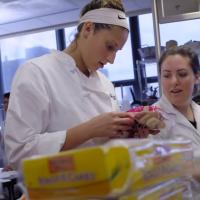Saltwater Brewery was a regular microbrewery that made great craft beer – packaged with the usual plastic six pack rings. As fishermen who saw firsthand the amount of plastic pollution in the ocean, though, they felt they needed to make a change to help marine animals. They came up with the idea to create edible six pack rings made of biodegradable materials left over from the brewing process. Now, they’ve created a new company, E6PR, to sell their “Eco Six Pack Rings” to other companies like Corona that want to help clean up the oceans and improve their sustainability.
The edible six pack ring that's saving marine animals
Up Next


